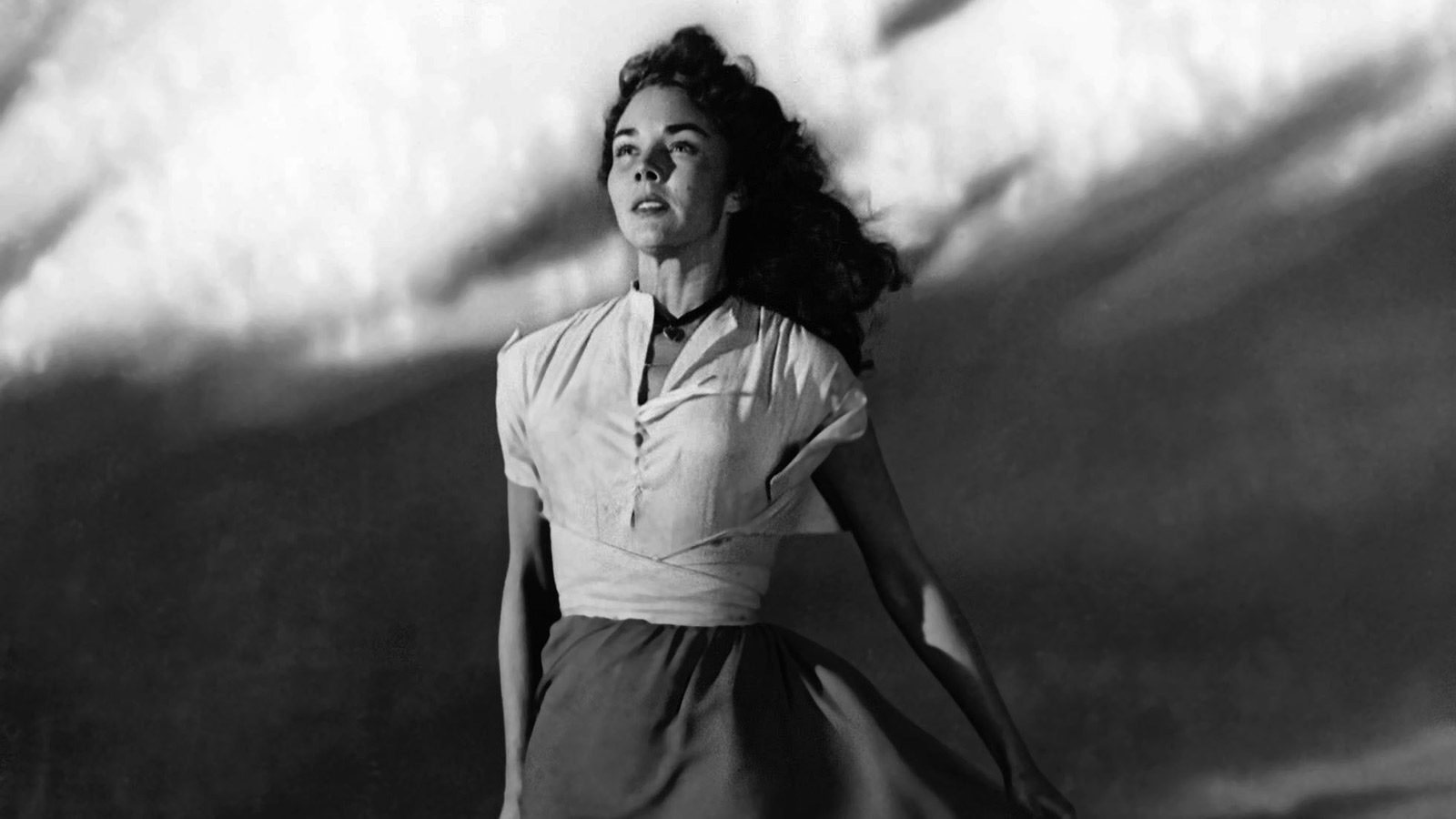
Basic Instinct
Classifying Jennifer Jones has always been a problem, for feminists in particular. Duel in the Sun inspired Laura Mulvey to re-examine some knotty issues of gender identification, while Molly Haskell has written that Jones was unreal, “a confirmation of women’s worst fears of men’s most lubricious fantasies.” For Haskell, in other words, she was a man’s woman.
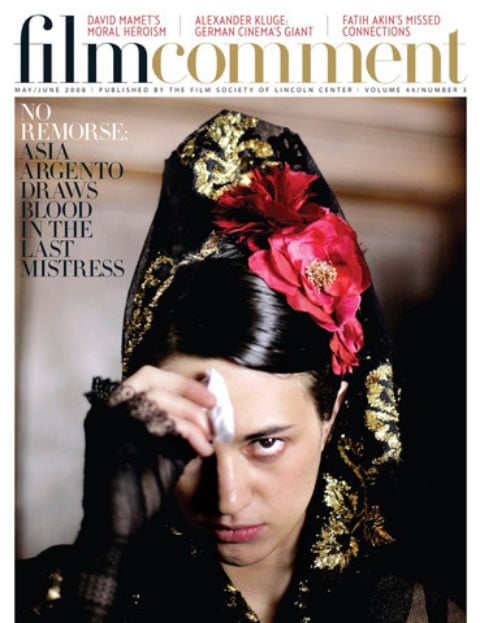
But what exactly does it mean to be a man’s woman, in the particular way that Jennifer Jones was? She’s neither tomboy nor career woman, and she couldn’t be further from a Hawksian sport. But, at least in the first half of her career, neither did she play a mother or sister or wife. Her gender role is formless, pure floating femininity—ungraspable, sometimes inadvertently smothering, but also prone to reverie, and teasing us with the possibility of transcendence. She apparently embodied these qualities in life as well. “Jennifer was able to merge her identity with the man she was with,” notes an unnamed friend in Edward Epstein’s Jones biography. “Her femininity was such that she allowed a man to feel more masculine.”
Her role in King Vidor’s Ruby Gentry (52), in which she wears pants instead of full skirts and corsets, is an exception. She may stroke those phallic rifles but she also shoots them, and then sublimates her libido into a destructive business force. In that film—one of her worst—the power of Ruby’s sexuality, never less than extreme, is equated with that of a man, but she ends up alone, while Jones’s most memorable characters are destroyed: by suicide or an epic special-effects storm, killed in a Technicolor S&M shootout with her true love, or chased by hunters until she falls down a hole to the center of the earth. It’s as if her uniquely feminine sexuality is too much, which is probably why it was so frequently literalized. She is often half “savage”: half-gypsy in Gone to Earth (in which she identifies with a wild fox she keeps as a pet), half-Chinese in Love Is a Many-Splendored Thing, and most famously as a half-breed in brownface, the swaggering Pearl Chavez in Duel in the Sun.
She was a tightly strung bow of a woman, willowy but curvaceous. “You can spot Ruby anytime she’s over the horizon,” one character remarks about her shape, but the source of her sexuality seems to lie beyond the limits of her own body, and it can be neither held nor controlled. This is what makes her such an oddly intimidating figure. Jones’s sexual energy is not corporal but vibrational, and it is all but visualized in her memorable Madame Bovary costume—a frothy white dress with cape that looks like a full-body halo of static electricity.
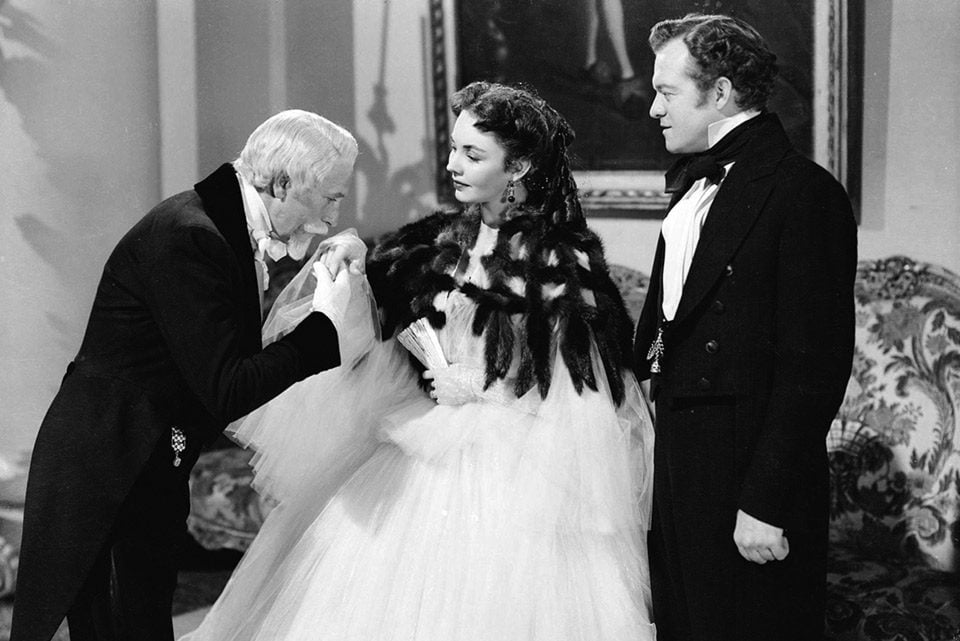
Madame Bovary
As an actress, she communicates this celestial quality with a dizzied but unflinching gaze, as if she were a medium. “I sort of hypnotize myself,” she said to a fan magazine while shooting Duel in the Sun. “I find myself really living the roles I play. I’ve read about the East Indian fakirs and mystics who are able to throw themselves into a trance, and I think that my own mental state is something like a trance when I’m acting. If anything else, any outside thought or impulse, disturbs the spell by intruding into my consciousness, I have to break off and start all over again.”
This hypersensitized altered reality is what drives her hypnotic performance in Powell and Pressburger’s Gone to Earth (50). But what makes her especially remarkable in that film, as in most of her preceding work, is the extreme physicality with which she achieves this mystic state, as disorienting as it is intense. In The Song of Bernadette (43), Bernadette is instructed by her vision of the Virgin Mary (“the Lady”) to dig a hole and eat the weeds near a spot where a spring will appear. Jones rubs the dirt all over her face with freaky reverence and chews like an animal. Director Henry King’s nephew recalls, “My uncle didn’t want Jennifer to actually eat the twigs; he only wanted her to indicate she was doing so. She wanted to actually do it, literally, since Bernadette had been told to do so by her Lady.”
In her pre-1950 films, when her amorphous intensity was at its most raw, she was both earthy and otherworldly, and these qualities sometimes clashed violently, perhaps the result of a head-on conflict with her own idealization. In the Ayn Rand–scripted Love Letters (45), an angelic-looking Jones is slumped over, knife in hand, blood splattered across her white dress, while the nearby fire has burned all but one fragment of a letter: “I think of you, my dear, as a distant promise of beauty untouched by the world.” Her performance in Portrait of Jennie (48) is similarly disarming, ghostly yet grounded. In that haunting and slightly crazy film, Jones—again as if she were a medium—delivers her touched lines matter-of-factly. She plays a girl who slowly ceases to exist as her portrait is being painted, and it’s unclear if she’s ever existed as anything but a muse to begin with.
Ruby Gentry
Jones was David O. Selznick’s discovery, then his mistress, and eventually his wife. Since Selznick’s sense of his own genius originated with the assumption that his personal tastes and those of the public at large were as one, he projected his own evolving adoration of Jones onto her public role as movie star. (Sometimes to everyone’s embarrassment—Vidor had to kick him off the set of Duel in the Sun because the microphones picked up the producer’s heavy breathing.) Attracted to her “eager, blushing quality,” he placed her in the role of ethereal ingénue in The Song of Bernadette (43), then as a blusteringly romantic girl-next-door in his home-front epic Since You Went Away (44), and then as several dozen iterations of an (almost) innocent nymphomaniac—a pure-hearted Girl Who Couldn’t Help It.
She played all of these characterizations to the hilt, combining their assortments of stereotypical notions into some sort of strange style, which leaves an impression of overall haziness broken up by hiccups of emotion. When roles on this continuum of male sexual fantasy, normally kept apart (their separation being essential to objectification), instead collide, the result is something wild and a little weird. Taken altogether, the marked neurosis of her acting in these roles is all about the anxiety of integration. She’s heaven and earth, saint and sinner, and also somewhere between woman and girl. You can hear it in her voice—a girlish chirp doing an impression of throaty—that cracks at the edges in a quaver.
Before Selznick entered her life she was Phylis Walker, wife of actor Robert Walker. The Walkers’ relationship was based on their mutual acting ambitions. “We were both in love with acting, and we were mutually attracted,” said Walker. “We played love scenes together from two to four, and then discovered that we weren’t acting.” Though she wasn’t much interested in being a celebrity, ducking from publicity whenever possible, she was so obsessed with acting that she accepted the Selznick-authored role of “Jennifer Jones,” both on screen and in life. “It’s natural for women to act,” she would say in 1962. “They do it all the time.”
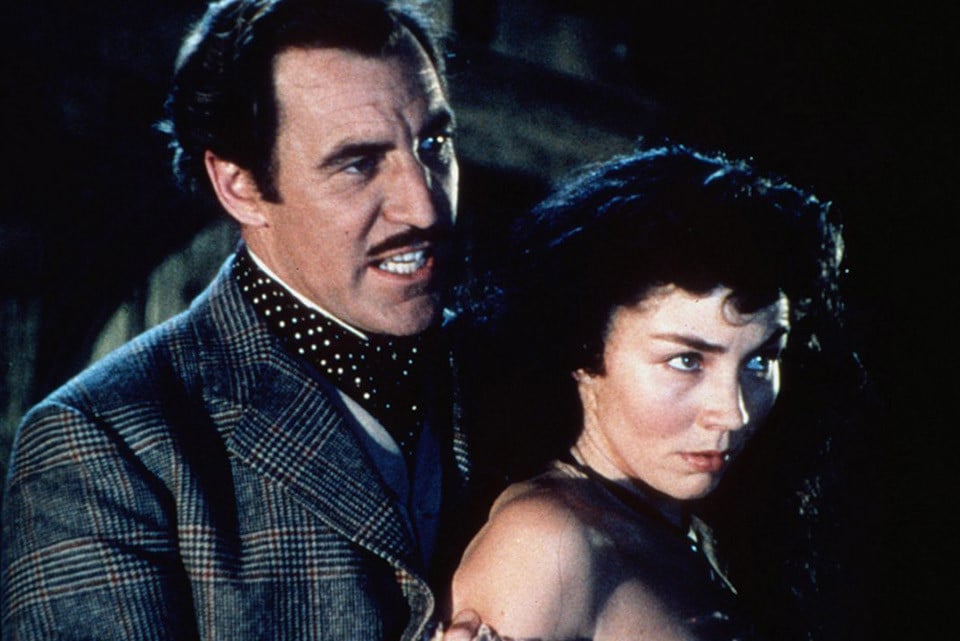
Gone to Earth
Jones liked to be molded. “She put herself completely in the hands of the director, more than any other actress I’ve ever worked with,” wrote John Huston in his autobiography. “And she was not an automaton. Jennifer took what you gave her and made it distinctly her own.” She was a director’s actor and a director’s wife, or rather, the wife of a producer who tried to direct other directors’ films, not to mention his own life.
But she gave her most wonderfully strange and singular performances in the late Forties up through the shooting of Gone to Earth, when she was not Selznick’s wife but his lover. She resisted marrying him for years, and even went into Jungian analysis to examine her reluctance. Not long after she finally relented, her acting became more turgid and strained. She seemed to have lost the space she needed to work herself into that trance-like zone. “It’s startling to read what men think of women,” she once said. “You build strange, high walls around us. And it’s so difficult for us to get over the walls.”
“Why get over them?” asked the reporter, “Why do women have to win?”
“We don’t. Because if we win, we lose. Once we win we’re all men.”
Jones chose an alternative; she played out a male sexual fantasy so completely that it should be considered a feminist act. She’s not the projection of a fantasy—not some limp Veronica Lake as waif or femme fatale—but the active embodiment of one. Her reciprocated desire is so strong that it cancels out her pursuer’s desire, and his controlling nature along with it. There’s a moment in almost all of her films when, with a full-body quiver of anxiety, her full cheeks slacken and she says—in a low, low lisp—“yeth.” Once she gives in to the man pursuing her, usually early on, the game is over. They cannot possess her, because she’s already theirs; she’s given in “body and soul” (as Haskell wrote) so completely that she is of them. Her total integration with the men who desire her effectively nullifies their power.
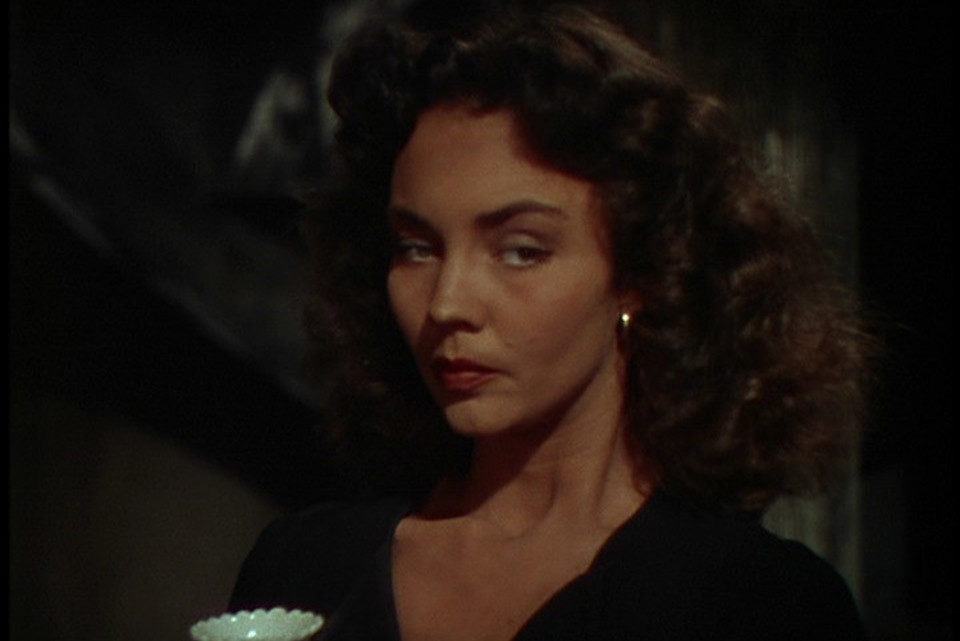
Duel in the Sun
Even worse than losing this battle of possession, the male loses the illusion that he ever had any real power to gain in the first place. It was never anything more than play—role play, fantasy. Seduction is a game in which she is a willing participant. There’s a scene in Duel in the Sun (46) in which Lewt (Gregory Peck) walks in on Pearl (Jones) scrubbing the floor on hands and knees, her bottom swiveling exaggeratedly, an obvious enactment of a fantasy. Her expression at first conveys surprise, but then she lowers her eyelids, turns around, and looks him over in a way that betrays both complicity and power. She throws her rag at him and then kisses him passionately. Lewt has met his match. In their next scene together, Pearl wants to go off alone with him but he’d prefer to engage her in a shooting contest. “Betcha I can hit that ding-dong straight off,” Lewt says as he aims his pistol at a bell. Her reply: “Who cares?”
There’s humor in Pearl’s aggressive disposal of gendered sexual etiquette. And there’s humor in the way she wiggles, giving her body fully to every gesture. Jones was best able to demonstrate the gift for comedy that laps around the edges of Duel in the film she made right after, Ernst Lubitsch’s Cluny Brown (46). She plays the daughter of a plumber who wants to be good and marry well, but who can’t stop rolling up her sleeves and messing around with people’s pipes. “The role of Cluny Brown requires great, deep humor, not just a technical humor, not routine comedy with double takes that the audience knows are coming three-steps ahead,” said Lubitsch. “Jennifer Jones is capable of this rare humor.” It’s stylized physical humor requiring keen intuition and bodily control.
Michael Powell noted this mastery of her body: “Jennifer had had good teachers in Hollywood, but this approach to the physical side of the part was entirely her own.” He was talking about the way that Jones wore period corsets, but he could have been referring to her unique power as an actress, as an artist, and ultimately as a woman. Her body was her instrument, one of her primary expressive tools, and she used it to describe the walls built around women and the towers of idealization atop which they found themselves stranded. Throughout her career, Jones contorted herself into all the stereotypes that were handed to her, and in the process illustrated their unreality.







